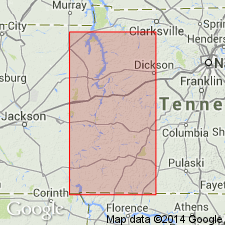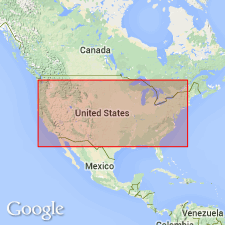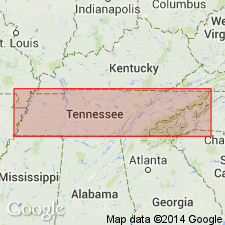
- Usage in publication:
-
- Decaturville chert
- Modifications:
-
- Named
- Dominant lithology:
-
- Chert
- AAPG geologic province:
-
- Cincinnati arch
Summary:
Decaturville is a gray porous chert, 0 to 6 ft thick, well developed around Decaturville, Decatur Co., western TN. At base is a thinner bedded sandy chert that weathers more readily and is not well exposed. Although thin, unit extends half way across the State. Not identified east of Tennessee River except in Hardin Co. Fauna closely allied to Birdsong, New Scotland, and Becraft. Seems best referred to earliest Becraft time. Unconformably overlies Birdsong shale and unconformably underlies Quall limestone. Is top formation of Helderbergian.
Source: GNU records (USGS DDS-6; Reston GNULEX).

- Usage in publication:
-
- Decaturville chert
- Modifications:
-
- Revised
- AAPG geologic province:
-
- Cincinnati arch
Summary:
Decaturville chert shown on correlation chart as uppermost formation in Linden group. Occurs above Birdsong shale and below Quall limestone.
Source: GNU records (USGS DDS-6; Reston GNULEX).

- Usage in publication:
-
- Decaturville chert zone
- Modifications:
-
- Revised
- AAPG geologic province:
-
- Cincinnati arch
Summary:
Pg. 280, 290-292, 295-296, 301-302. Decaturville chert zone in Ross formation. Considered a zone conformably interbedded with beds of the [/]Ross limestone member [=Ross limestone of Foerste, 1903], Bear Branch facies, and Birdsong shale member of [/]Ross formation (new). Term Decaturville zone is applied to the porous fossiliferous gray chert that is developed by chertification of limestone zone that carries large specimens of brachiopods and overlies the Bryozoan zone. [Age is Early Devonian.]
[Name Ross preempted by Ross Limestone of Foerste (1903), which = Ross limestone member of author. The application of an identical geographic name to a stratigraphic unit and its parts (Ross limestone member of Ross formation) conflicts with nomenclature guidelines (CSN, 1933; ACSN, 1961, 1970; NACSN, 1983, 2005, 2021). Precise duplication of geographic names of sedimentary units shall not be allowed, except as a most urgent necessity because of scarcity of available names or other conditions, and then only if geographic and stratigraphic separation is such as to preclude any possible chance of confusion (CSN, 1933).]
Source: Modified from US geologic names lexicon (USGS Bull. 1200, p. 1062).
For more information, please contact Nancy Stamm, Geologic Names Committee Secretary.
Asterisk (*) indicates published by U.S. Geological Survey authors.
"No current usage" (†) implies that a name has been abandoned or has fallen into disuse. Former usage and, if known, replacement name given in parentheses ( ).
Slash (/) indicates name conflicts with nomenclatural guidelines (CSN, 1933; ACSN, 1961, 1970; NACSN, 1983, 2005, 2021). May be explained within brackets ([ ]).

